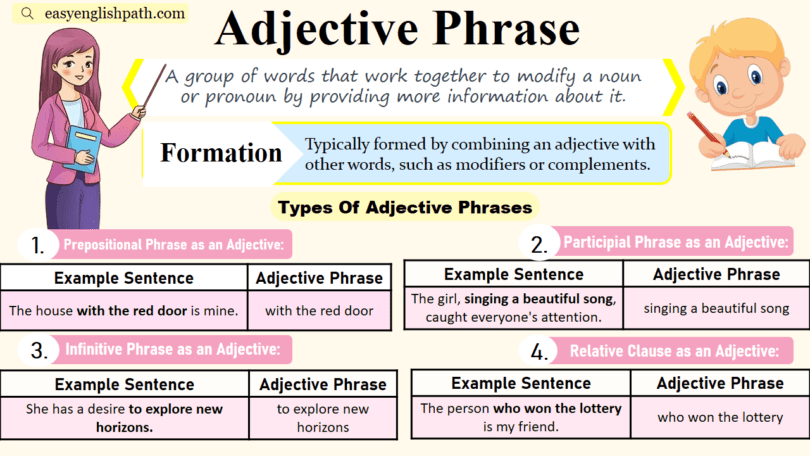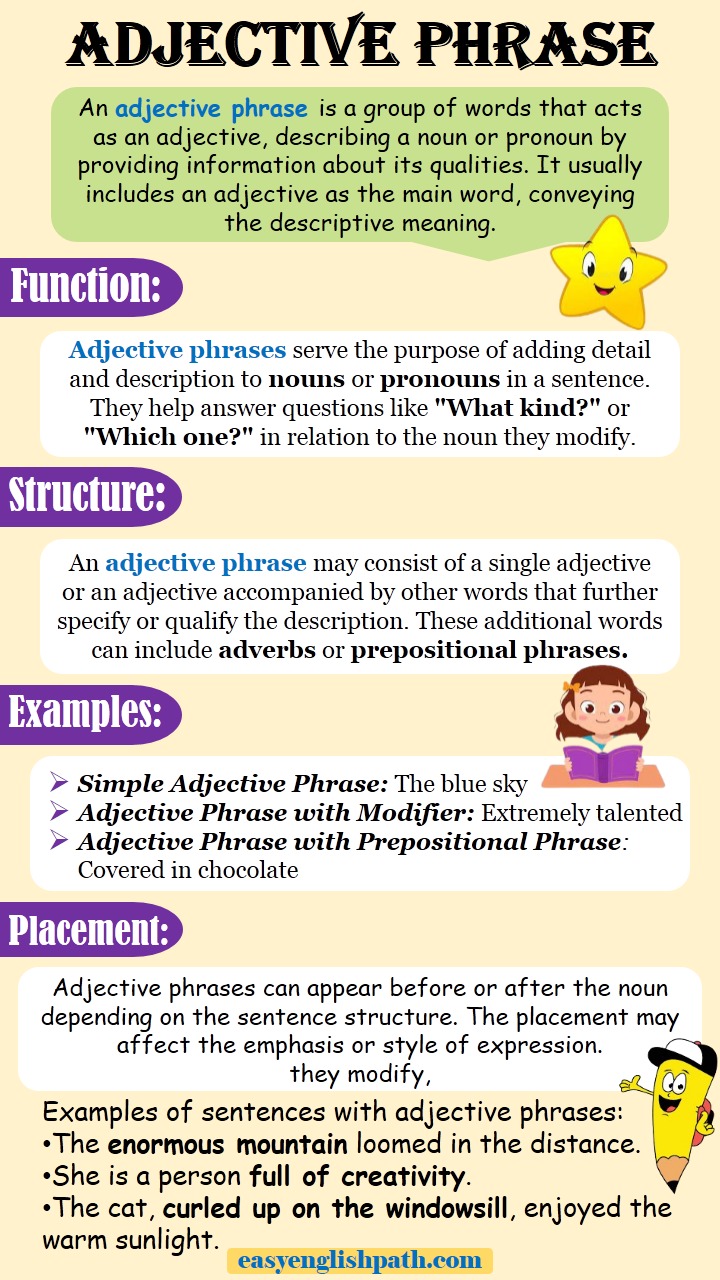An adjective phrase is a group of words that modifies a noun by providing more details about it. It makes sentences clearer, descriptive, and engaging. Without adjective phrases, writing can feel plain and less expressive. Using them correctly helps in effective communication, allowing speakers and writers to add depth and specificity to their descriptions.
What is an Adjective Phrase?
An adjective phrase is a group of words that collectively modify a noun functioning as an adjective. It typically includes an adjective and its modifiers.
- The furry cat napped lazily on the windowsill.
- In the garden, we found a sparkling fountain.
- She wore a dress with a vibrant floral pattern.
How to Identify Adjective Phrase
To identify an adjective phrase, look for a noun that is being described and a group of words that act together to provide that description, often including an adjective and its modifiers.
For example, The book on the table is mine, the phrase on the table is an adjective phrase modifying ‘book’. Similarly, in ‘She wore a dress with beautiful embroidery. with beautiful embroidery is the adjective phrase describing ‘dress’
Difference Between Adjective Phrase and Adjective Clause
Adjective Phrase
An adjective phrase is a group of words that function together as an adjective to modify a noun. It usually includes an adjective and its modifiers. An adjective phrase does not have a subject and a verb.
- She has a necklace made of gold.
- They live in a house bigger than ours.
- The car with the red stripes is fast.
- The man interested in the job is here.
- The book on the table is mine.
Adjective Clause
An adjective clause, also known as a relative clause, is a group of words that include a subject and a verb. It acts as an adjective to modify a noun and usually starts with a relative pronoun like who, whom, whose, that, or which.
- The book that is on the table is mine.
- She has a necklace which is made of gold.
- They live in a house that is bigger than ours.
- The car which has the red stripes is fast.
- The man who is interested in the job is here.
Types of Adjective Phrase
- Attributive Adjective Phrase
- Predicative Adjective Phrase
- Possessive Adjective Phrase
1. Attributive Adjective Phrase
An attributive adjective phrase is a group of words that describes a noun by providing extra information about its qualities. It is placed before the noun it modifies within the noun phrase.
- The cat found a spot in the sun with a warm blanket.
- We visited a beach with golden sand.
- His jacket had a pocket for his favorite pen.
- The mountain path had twisting turns.
2. Predicative Adjective Phrase
A predicative adjective phrase acts like an adjective in the sentence’s predicate, coming after a linking verb (e.g., is, seems). It modifies the subject, unlike an attributive adjective phrase that modifies the noun directly before it.
- The room felt cozy.
- The flower looks vibrant.
- His story seemed unbelievable.
- The soup tastes spicy.
3. Possessive Adjective Phrase
A possessive adjective phrase uses words like ‘my,’ ‘your,’ etc., to show ownership and modify a noun.
- I found my wallet on the kitchen counter.
- They admired her artwork in the gallery.
- We need to bring our umbrellas; it might rain.
- The cat played with its favorite toy all day.
Why are Adjective Phrases Important
An adjective phrase is important because it makes sentences more descriptive and clear. It adds more details about a noun, making writing interesting and easy to understand. Without adjective phrases, sentences would be plain and less informative, making it harder to express clear meanings.
Common Mistakes with Adjective Phrase
1️⃣ Misplacing the Adjective Phrase
❌ She bought a dress from the store with blue flowers. (Unclear: Is the store or the dress blue?)
✅ She bought a dress with blue flowers from the store. (Now it’s clear that the dress has blue flowers.)
2️⃣ Using Too Many Adjectives
❌ He is a tall, smart, kind, hardworking, generous, funny, nice boy. (Too crowded)
✅ He is a tall and kind boy with a great sense of humor. (More natural)
3️⃣ Forgetting the Noun It Modifies
❌ Very beautiful and colorful. (Incomplete—what is beautiful and colorful?)
✅ The garden is very beautiful and colorful. (Now it’s complete)
4️⃣ Confusing Adjective Phrases with Adverb Phrases
❌ She spoke in a happy voice to the kids excitedly. (Confusing)
✅ She spoke to the kids in a happy voice. (Clear adjective phrase modifying “voice”)
5️⃣ Overusing “Very” and Weak Modifiers
❌ The movie was very, very good.
✅ The movie was absolutely amazing. (Stronger and better word choice)
Adjective Phrase Examples
- The cat, sleek and agile, crept through the garden.
- His essay was remarkably persuasive.
- The morning air felt crisp and refreshing.
- She displayed a confident attitude.
- The cake was incredibly flavorful.
- The movie had a surprisingly twisty plot.
- The sunset painted the sky orange and pink.
- The new gadget is compact and powerful.
- The hiking trail led to a beautiful waterfall.
- Her laughter was joyful.
FAQs About Adjective Phrases
1️⃣ What is an adjective phrase?
An adjective phrase is a group of words that modifies a noun by adding more details, making descriptions clearer and more specific.
2️⃣ How is an adjective phrase different from an adjective?
An adjective is a single word (beautiful), while an adjective phrase includes additional words (very beautiful garden).
3️⃣ Where is an adjective phrase used in a sentence?
It usually comes before the noun (a really exciting movie) or after the noun (a movie that was really exciting).
4️⃣ Can an adjective phrase contain an adverb?
Yes, adverbs like very, quite, or extremely can be part of an adjective phrase (a very tall building).
5️⃣ Why are adjective phrases important?
They make sentences more descriptive, engaging, and clear, helping to provide better details about nouns.
You May Also Like






